Analyzing the Ethics of Whistleblowing: The Snowden Case Study
VerifiedAdded on 2023/01/12
|5
|967
|93
Case Study
AI Summary
This case study analyzes the ethical dimensions of Edward Snowden's actions, focusing on his role as a whistleblower and the implications of his release of confidential government information. The analysis explores the application of various ethical theories, including virtue ethics, deontology, ethical egoism, and utilitarianism, to understand the moral justifications and consequences of Snowden's choices. The case study delves into the ethical dilemmas faced by Snowden, considering his responsibilities as a former CIA employee and the potential harm caused by his actions. It examines different perspectives on the ethical justification of whistleblowing, exploring the balance between public interest, national security, and individual moral obligations. The study also considers alternative courses of action Snowden could have taken and evaluates the circumstances under which whistleblowing can be ethically ideal. The case study references several academic sources to support its analysis.
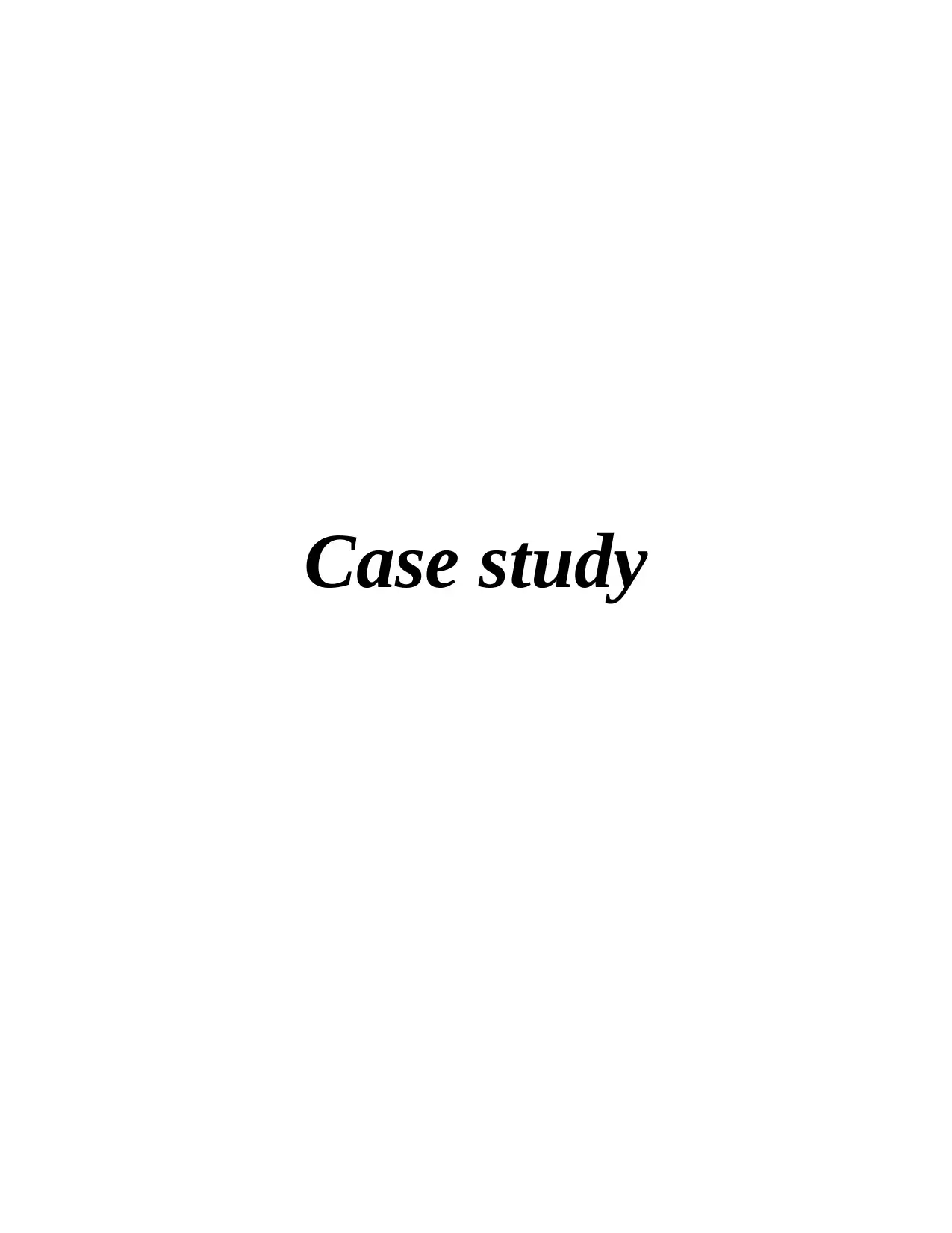
Case study
Paraphrase This Document
Need a fresh take? Get an instant paraphrase of this document with our AI Paraphraser
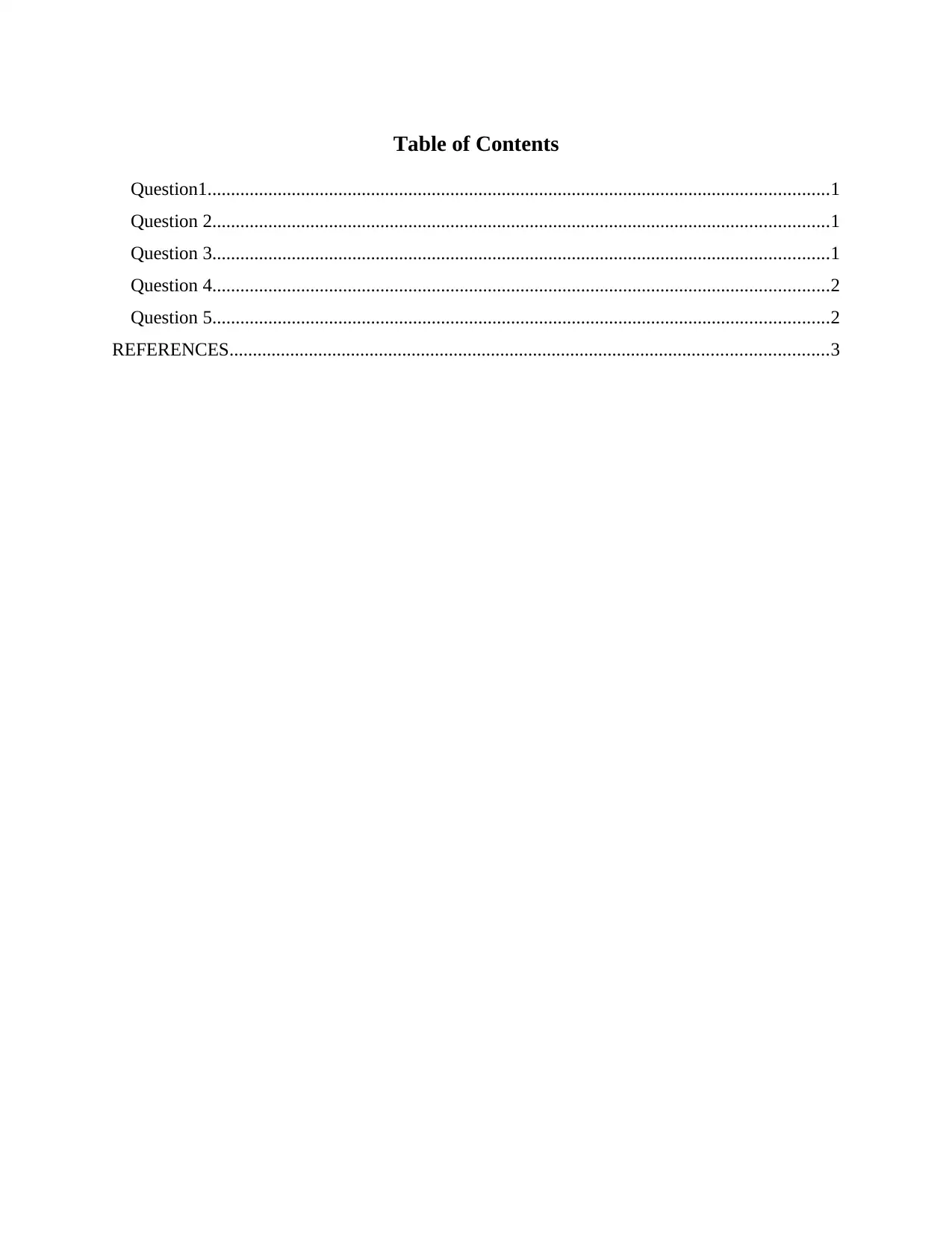
Table of Contents
Question1.....................................................................................................................................1
Question 2....................................................................................................................................1
Question 3....................................................................................................................................1
Question 4....................................................................................................................................2
Question 5....................................................................................................................................2
REFERENCES................................................................................................................................3
Question1.....................................................................................................................................1
Question 2....................................................................................................................................1
Question 3....................................................................................................................................1
Question 4....................................................................................................................................2
Question 5....................................................................................................................................2
REFERENCES................................................................................................................................3
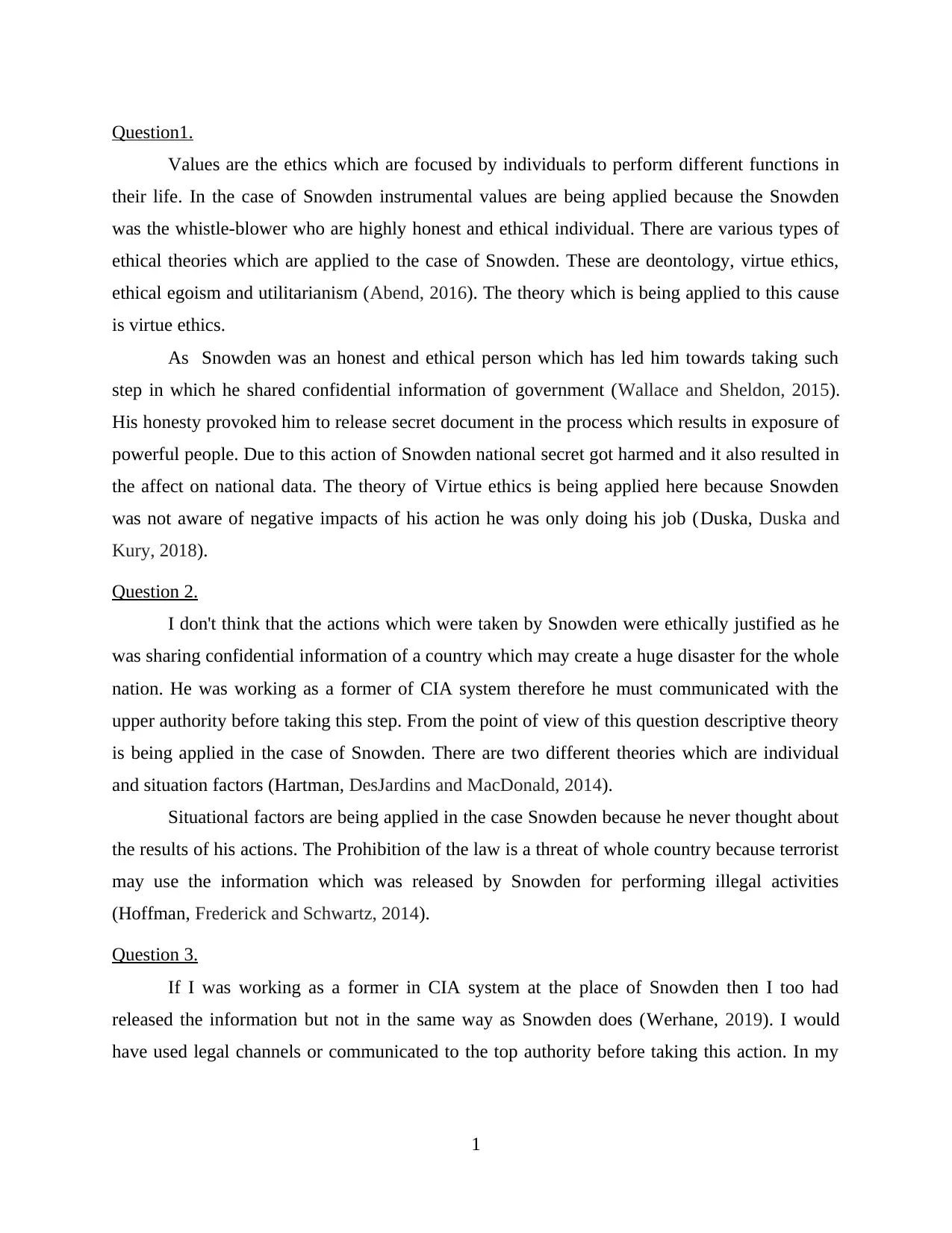
Question1.
Values are the ethics which are focused by individuals to perform different functions in
their life. In the case of Snowden instrumental values are being applied because the Snowden
was the whistle-blower who are highly honest and ethical individual. There are various types of
ethical theories which are applied to the case of Snowden. These are deontology, virtue ethics,
ethical egoism and utilitarianism (Abend, 2016). The theory which is being applied to this cause
is virtue ethics.
As Snowden was an honest and ethical person which has led him towards taking such
step in which he shared confidential information of government (Wallace and Sheldon, 2015).
His honesty provoked him to release secret document in the process which results in exposure of
powerful people. Due to this action of Snowden national secret got harmed and it also resulted in
the affect on national data. The theory of Virtue ethics is being applied here because Snowden
was not aware of negative impacts of his action he was only doing his job (Duska, Duska and
Kury, 2018).
Question 2.
I don't think that the actions which were taken by Snowden were ethically justified as he
was sharing confidential information of a country which may create a huge disaster for the whole
nation. He was working as a former of CIA system therefore he must communicated with the
upper authority before taking this step. From the point of view of this question descriptive theory
is being applied in the case of Snowden. There are two different theories which are individual
and situation factors (Hartman, DesJardins and MacDonald, 2014).
Situational factors are being applied in the case Snowden because he never thought about
the results of his actions. The Prohibition of the law is a threat of whole country because terrorist
may use the information which was released by Snowden for performing illegal activities
(Hoffman, Frederick and Schwartz, 2014).
Question 3.
If I was working as a former in CIA system at the place of Snowden then I too had
released the information but not in the same way as Snowden does (Werhane, 2019). I would
have used legal channels or communicated to the top authority before taking this action. In my
1
Values are the ethics which are focused by individuals to perform different functions in
their life. In the case of Snowden instrumental values are being applied because the Snowden
was the whistle-blower who are highly honest and ethical individual. There are various types of
ethical theories which are applied to the case of Snowden. These are deontology, virtue ethics,
ethical egoism and utilitarianism (Abend, 2016). The theory which is being applied to this cause
is virtue ethics.
As Snowden was an honest and ethical person which has led him towards taking such
step in which he shared confidential information of government (Wallace and Sheldon, 2015).
His honesty provoked him to release secret document in the process which results in exposure of
powerful people. Due to this action of Snowden national secret got harmed and it also resulted in
the affect on national data. The theory of Virtue ethics is being applied here because Snowden
was not aware of negative impacts of his action he was only doing his job (Duska, Duska and
Kury, 2018).
Question 2.
I don't think that the actions which were taken by Snowden were ethically justified as he
was sharing confidential information of a country which may create a huge disaster for the whole
nation. He was working as a former of CIA system therefore he must communicated with the
upper authority before taking this step. From the point of view of this question descriptive theory
is being applied in the case of Snowden. There are two different theories which are individual
and situation factors (Hartman, DesJardins and MacDonald, 2014).
Situational factors are being applied in the case Snowden because he never thought about
the results of his actions. The Prohibition of the law is a threat of whole country because terrorist
may use the information which was released by Snowden for performing illegal activities
(Hoffman, Frederick and Schwartz, 2014).
Question 3.
If I was working as a former in CIA system at the place of Snowden then I too had
released the information but not in the same way as Snowden does (Werhane, 2019). I would
have used legal channels or communicated to the top authority before taking this action. In my
1
⊘ This is a preview!⊘
Do you want full access?
Subscribe today to unlock all pages.

Trusted by 1+ million students worldwide
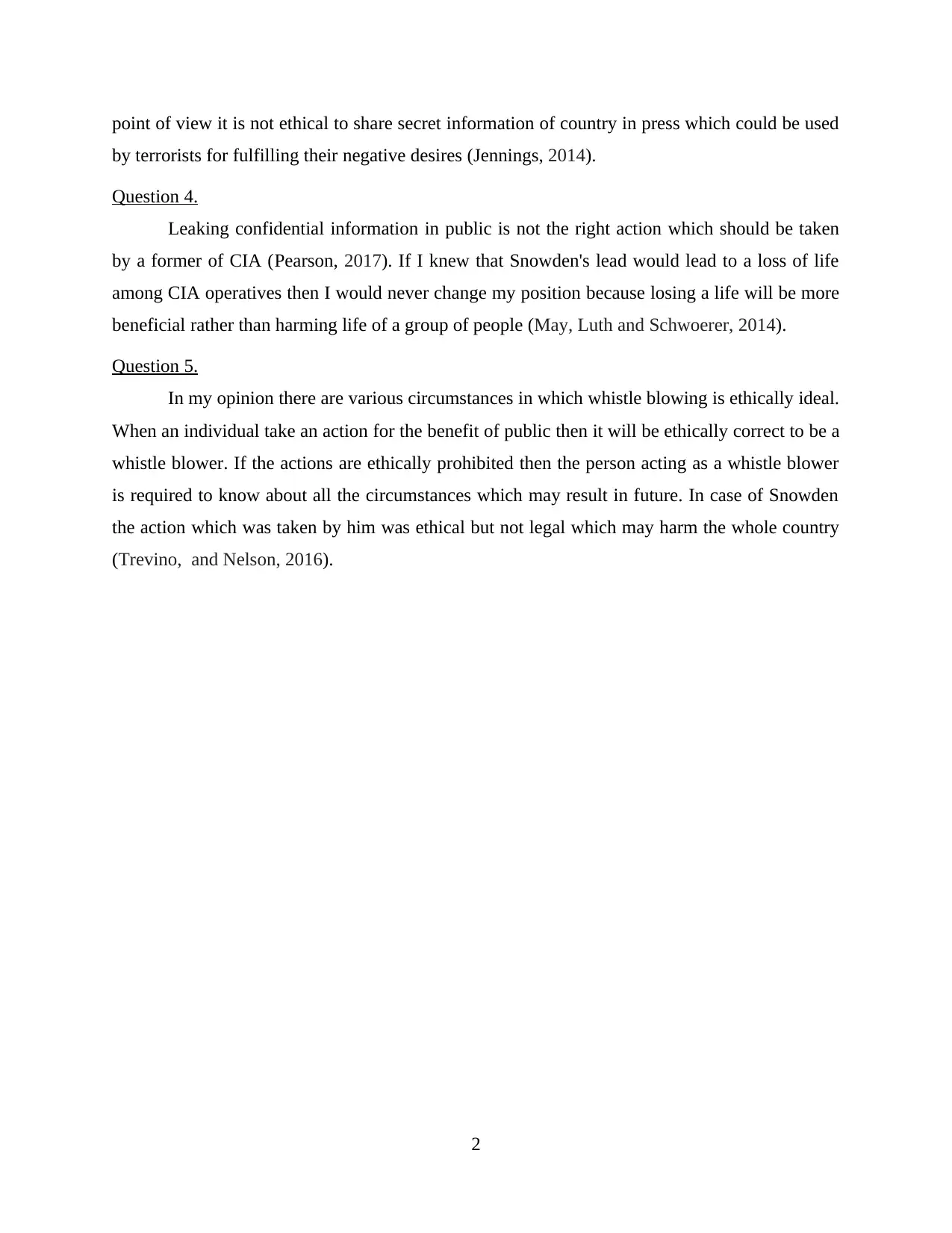
point of view it is not ethical to share secret information of country in press which could be used
by terrorists for fulfilling their negative desires (Jennings, 2014).
Question 4.
Leaking confidential information in public is not the right action which should be taken
by a former of CIA (Pearson, 2017). If I knew that Snowden's lead would lead to a loss of life
among CIA operatives then I would never change my position because losing a life will be more
beneficial rather than harming life of a group of people (May, Luth and Schwoerer, 2014).
Question 5.
In my opinion there are various circumstances in which whistle blowing is ethically ideal.
When an individual take an action for the benefit of public then it will be ethically correct to be a
whistle blower. If the actions are ethically prohibited then the person acting as a whistle blower
is required to know about all the circumstances which may result in future. In case of Snowden
the action which was taken by him was ethical but not legal which may harm the whole country
(Trevino, and Nelson, 2016).
2
by terrorists for fulfilling their negative desires (Jennings, 2014).
Question 4.
Leaking confidential information in public is not the right action which should be taken
by a former of CIA (Pearson, 2017). If I knew that Snowden's lead would lead to a loss of life
among CIA operatives then I would never change my position because losing a life will be more
beneficial rather than harming life of a group of people (May, Luth and Schwoerer, 2014).
Question 5.
In my opinion there are various circumstances in which whistle blowing is ethically ideal.
When an individual take an action for the benefit of public then it will be ethically correct to be a
whistle blower. If the actions are ethically prohibited then the person acting as a whistle blower
is required to know about all the circumstances which may result in future. In case of Snowden
the action which was taken by him was ethical but not legal which may harm the whole country
(Trevino, and Nelson, 2016).
2
Paraphrase This Document
Need a fresh take? Get an instant paraphrase of this document with our AI Paraphraser
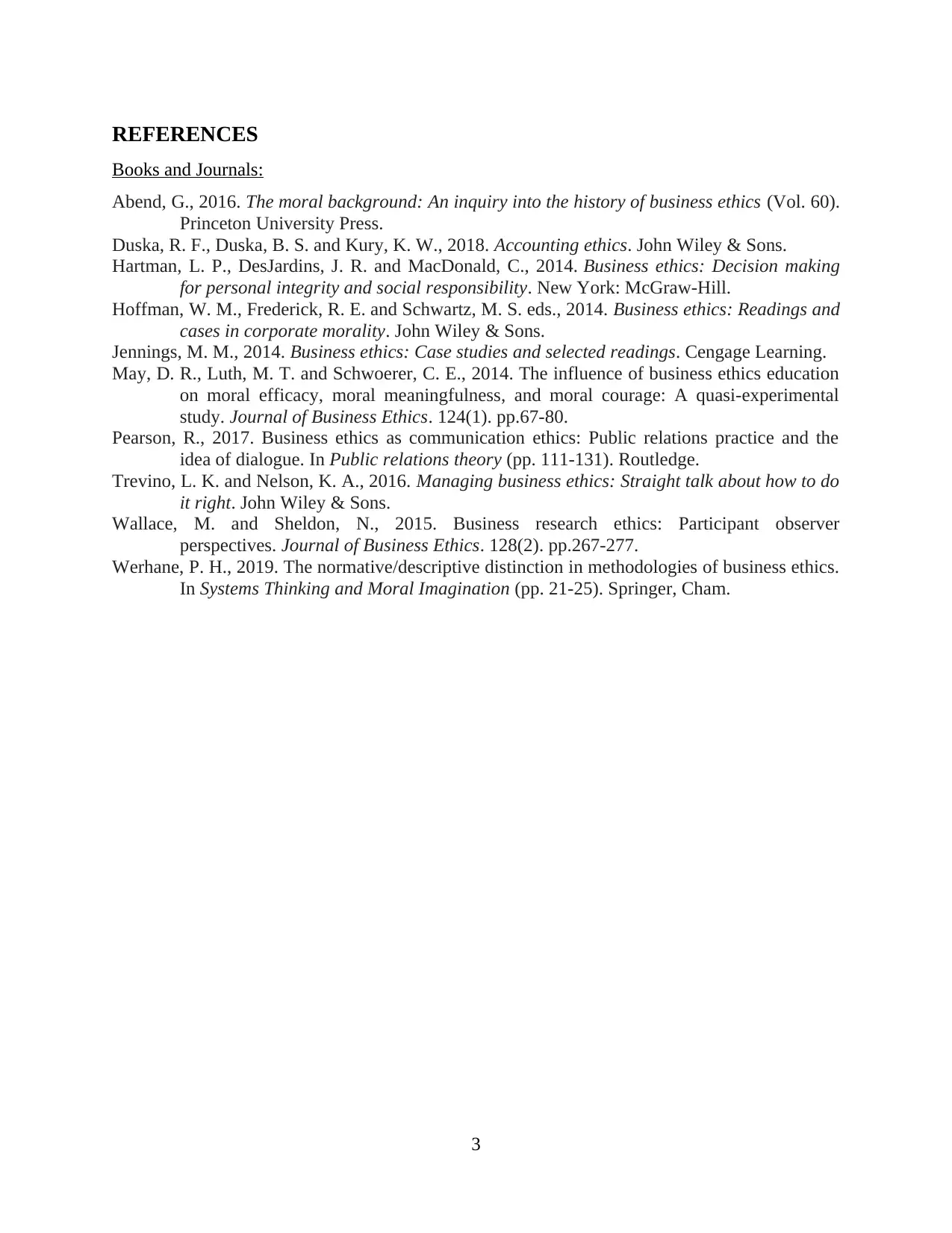
REFERENCES
Books and Journals:
Abend, G., 2016. The moral background: An inquiry into the history of business ethics (Vol. 60).
Princeton University Press.
Duska, R. F., Duska, B. S. and Kury, K. W., 2018. Accounting ethics. John Wiley & Sons.
Hartman, L. P., DesJardins, J. R. and MacDonald, C., 2014. Business ethics: Decision making
for personal integrity and social responsibility. New York: McGraw-Hill.
Hoffman, W. M., Frederick, R. E. and Schwartz, M. S. eds., 2014. Business ethics: Readings and
cases in corporate morality. John Wiley & Sons.
Jennings, M. M., 2014. Business ethics: Case studies and selected readings. Cengage Learning.
May, D. R., Luth, M. T. and Schwoerer, C. E., 2014. The influence of business ethics education
on moral efficacy, moral meaningfulness, and moral courage: A quasi-experimental
study. Journal of Business Ethics. 124(1). pp.67-80.
Pearson, R., 2017. Business ethics as communication ethics: Public relations practice and the
idea of dialogue. In Public relations theory (pp. 111-131). Routledge.
Trevino, L. K. and Nelson, K. A., 2016. Managing business ethics: Straight talk about how to do
it right. John Wiley & Sons.
Wallace, M. and Sheldon, N., 2015. Business research ethics: Participant observer
perspectives. Journal of Business Ethics. 128(2). pp.267-277.
Werhane, P. H., 2019. The normative/descriptive distinction in methodologies of business ethics.
In Systems Thinking and Moral Imagination (pp. 21-25). Springer, Cham.
3
Books and Journals:
Abend, G., 2016. The moral background: An inquiry into the history of business ethics (Vol. 60).
Princeton University Press.
Duska, R. F., Duska, B. S. and Kury, K. W., 2018. Accounting ethics. John Wiley & Sons.
Hartman, L. P., DesJardins, J. R. and MacDonald, C., 2014. Business ethics: Decision making
for personal integrity and social responsibility. New York: McGraw-Hill.
Hoffman, W. M., Frederick, R. E. and Schwartz, M. S. eds., 2014. Business ethics: Readings and
cases in corporate morality. John Wiley & Sons.
Jennings, M. M., 2014. Business ethics: Case studies and selected readings. Cengage Learning.
May, D. R., Luth, M. T. and Schwoerer, C. E., 2014. The influence of business ethics education
on moral efficacy, moral meaningfulness, and moral courage: A quasi-experimental
study. Journal of Business Ethics. 124(1). pp.67-80.
Pearson, R., 2017. Business ethics as communication ethics: Public relations practice and the
idea of dialogue. In Public relations theory (pp. 111-131). Routledge.
Trevino, L. K. and Nelson, K. A., 2016. Managing business ethics: Straight talk about how to do
it right. John Wiley & Sons.
Wallace, M. and Sheldon, N., 2015. Business research ethics: Participant observer
perspectives. Journal of Business Ethics. 128(2). pp.267-277.
Werhane, P. H., 2019. The normative/descriptive distinction in methodologies of business ethics.
In Systems Thinking and Moral Imagination (pp. 21-25). Springer, Cham.
3
1 out of 5
Related Documents
Your All-in-One AI-Powered Toolkit for Academic Success.
+13062052269
info@desklib.com
Available 24*7 on WhatsApp / Email
![[object Object]](/_next/static/media/star-bottom.7253800d.svg)
Unlock your academic potential
Copyright © 2020–2025 A2Z Services. All Rights Reserved. Developed and managed by ZUCOL.





